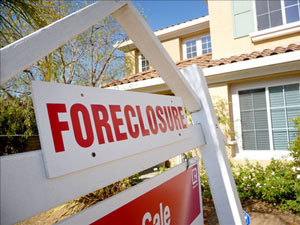-Staff Writer-

WASHINGTON (FinalCall.com) – If you thought the foreclosure crisis was nearing an end, think again. A recently released study shows millions of more devastating foreclosures ahead and it may not even be halfway over. Who are most likely to lose their homes? Blacks and Latinos.
About 2.7 million of the mortgages made at the height of the housing bubble have ended in foreclosure and at least another 3.6 million likely will fail in the next few years, the new Center for Responsible Lending research report shows. That means the nation is not yet midway through a foreclosure crisis that mires the economy, according to the analysis.
The report–“Lost Ground, 2011”–finds that while most people who have lost their homes have been White and in middle-or higher-income brackets, Black and Latino families have suffered a disproportionate share of losses. The research also shows that differences in income and credit history don’t explain why communities of color have been harder hit–but predatory mortgages do.
Meet the Sherwoods, your typical family trying to enjoy their American dream of home ownership. Both spouses were working when they bought a home in 2006 and were proud of their 700 credit scores. Buying a home was a dream come true until James Sherwood was laid off his job in 2010.
“I was devastated. I immediately thought, how are we going to pay the mortgage? We struggled for months and borrowed money from family and friends. We cut the cable and eliminated anything we could live without. We were just holding on with an Adjustable Rate Mortgage (ARM) that seemed to go up at whim,” he told The Final Call.
“And then my wife got laid off. I found another job but for much less pay. We got so behind, we couldn’t find any help and we just lost our most prized possession, our home. We live in an apartment now with four children. We can pay the bills but I’m still heartsick over the experience but I know now that with my credit score I deserved a better loan, a fixed rate mortgage but was given something else.”
Among the report’s findings:
Foreclosure rates for mortgages with prepayment penalties or other predatory terms have been much higher than loans without such features.
Blacks and Latinos across the credit score spectrum were more likely to receive a high cost mortgage with risky features. Blacks and Latinos with good credit (a 660+ FICO score) received a high-cost loan more than three times as often as White borrowers.
High concentrations of risky mortgages help explain why Blacks and Latinos at every income level have been hit harder by foreclosures than Whites with similar incomes. For example, the foreclosure rate for low and moderate income Blacks is about 80 percent higher than that for comparable White households. Foreclosure rates for higher income Latinos is more than three times that of higher income Whites.
The foreclosure problem doesn’t stop with what loans were received. There are also problems with how foreclosures are handled. The Office of the Comptroller of the Currency, the Federal Reserve, and Office of Thrift Supervision took enforcement actions in April. Fourteen large mortgage servicers were required to correct deficiencies in their servicing and foreclosure processes and to engage independent firms to conduct a multi-faceted independent review of foreclosure actions that occurred in 2009 and 2010.
This is a major government effort that could affect four and a half million homeowners as long as they received their mortgage from one of the following servicers: Ally’s GMAC Mortgage, Aurora Bank, Bank of America, Citibank, EverBank, HSBC, JPMorgan Chase, MetLife, OneWest, PNC, Sovereign Bank, SunTrust, U.S. Bank, and Wells Fargo.
Independent consultants are charged with evaluating whether borrowers suffered financial injury through errors, misrepresentations, or other deficiencies in foreclosure practices and determining appropriate remediation for those customers. Where a borrower suffered financial injury as a result of such practices, the consent orders require remediation to be provided.
“The independent foreclosure review is a significant component of the mortgage servicers’ compliance with our enforcement actions,” said acting Comptroller of the Currency John Walsh. “These requirements help ensure that the servicers provide appropriate compensation to borrowers who suffered financial harm as a result of improper practices identified in our enforcement actions.”
As of Nov. 1, the mortgage servicers covered by the enforcement actions began mailing letters to eligible borrowers that explain how to request a review of their case if they believe they suffered financial injury in their foreclosure proceedings.
“The challenge is substantial, but the steps we have required the servicers to take are vitally important to resolving these issues in a way that respects the rights of those who have been harmed and helps to restore confidence in the system.”
Mr. Walsh said the reviews would take several months to complete, considering the large pool of borrowers that could be part of the review.
Visit www.IndependentForeclosureReview.com for more information about the review and claim process or call 1-888-952-9105, Monday through Friday from 8 a.m. to 10 p.m. ET and Saturday from 8 a.m. to 5 p.m. ET. Requests for review must be received by April 30, 2012.












